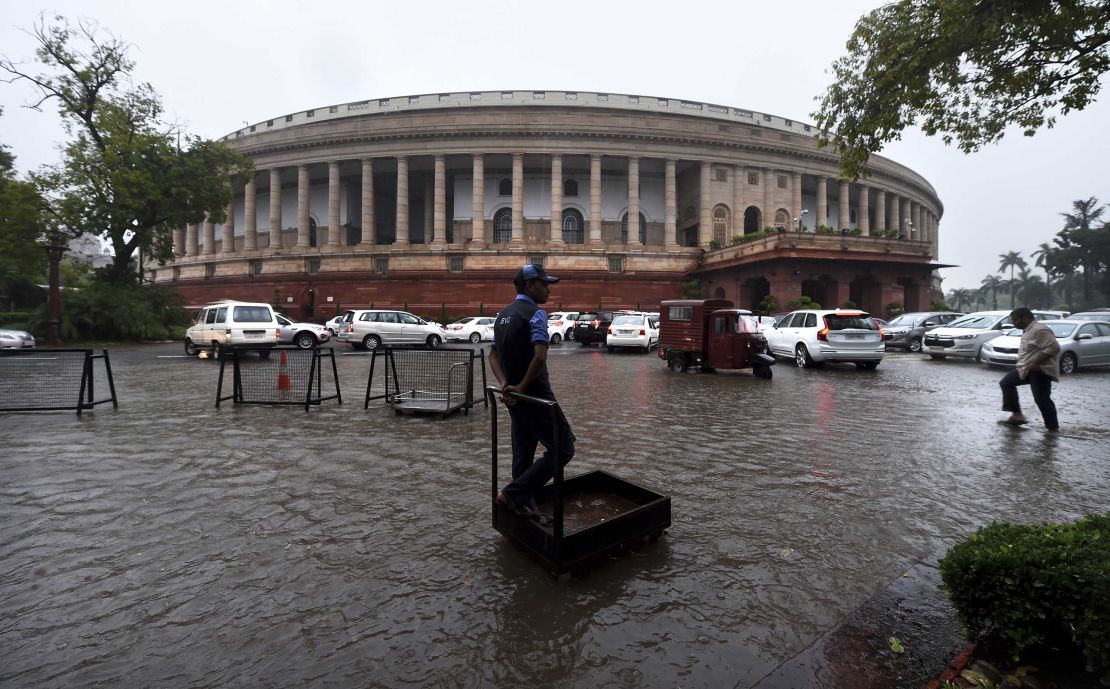India’s parliament has voted to reorganize and reclassify the state of Jammu and Kashmir, a far-reaching and highly contentious move that will give the government in New Delhi greater authority over the disputed Muslim-majority region.
The bill – passed by the lower house of parliament, the Lok Sabha, on Tuesday – will change Jammu and Kashmir’s administrative status from a state to a union territory. In the Indian system, state governments retain significant authority over local matters, but New Delhi has more of a say in the affairs of a union territory.
According to Om Birla, speaker of the lower house, the bill was passed by a digital vote with 370 members in favor and 70 against it.
The remote mountainous region of Ladakh, currently part of Jammu and Kashmir, will also be separated and turned into a standalone union territory, the government said.
The upper house of India’s parliament – the Rajya Sabha – passed the bill on Monday. It will now need to be signed into law by the President of India, Ram Nath Kovind, though it could face legal challenges in the future.
Kashmir is one of the world’s most dangerous flashpoints. Claimed in its entirety by both India and Pakistan, it has been the epicenter for more than 70 years of an often violent territorial struggle between the nuclear-armed neighbors.
On Monday, the government of Indian Prime Minister Narendra Modi announced it was revoking Article 370 of the constitution. The provision granted special status to the state of Jammu and Kashmir – which encompasses the area of the disputed Kashmir region controlled by India – including the power to have its own constitution, flag and autonomy over all matters, save for certain policy areas such as foreign affairs and defense.
The scrapping of Article 370, which had been in place since 1949, brings Jammu and Kashmir under all the provisions of the Indian constitution. The move will allow non-residents to purchase property in the valley, and apply for jobs or scholarships that had previously been reserved for the state’s residents.
Experts said the move could open the way for a steady demographic change in India’s only Muslim majority state. Revoking Kashmir’s special status was one of the promises made by Modi’s Hindu nationalist party ahead of recent national elections.

“It is very likely that we are going to see that happen now, with a systematic attempt to encourage non-Muslims to settle in the valley and to buy land and have protected enclaves,” said Harsh Mander, a human rights activist and author.
The bill that was passed on Tuesday will unilaterally alter the administration of Jammu and Kashmir without consultation from state leaders. As a union territory, it will be overseen by a New Delhi-appointed official.
Experts said the changes to Kashmir’s status could further inflame tensions and the risk of violence in an already unstable region.
Pakistan described the scrapping of Article 370 as illegal.
On Tuesday, Pakistan’s Prime Minister Imran Khan said his government would lobby the United Nations Security Council about the issue and was examining whether the International Court of Justice could intervene.
Speaking to Pakistan’s National Assembly, Khan said the ideology of Modi’s ruling party was “that Muslims should be ethnically cleansed in India.”
“If the world does not act now, if the so-called developed world does not uphold its own laws, then things will go to a place. That will damage the whole world,” Khan said.
Rising tensions
In the days leading up to Monday’s announcement, extra troops were moving up to Indian-controlled Kashmir, while a major annual Hindu pilgrimage to a mountain shrine in the region was called off.
Now, the state is on lockdown. Tens of thousands of new troops were deployed into what is already one of the most militarized places in the world. A broad communications blackout left many people without access to the internet and phone services across the territory, with measures also in place to prevent public meetings.
A number of prominent politicians have been placed under house arrest, including at least two former chief ministers of the state, according to CNN affiliate CNN-News18.
Since the start of an insurgency in Indian-controlled Kashmir in the 1990s, the leadership in New Delhi has often struggled to navigate what many say has become an increasingly fraught relationship with the local population.
Analysts say this has helped fuel militancy and a general sense of alienation, especially among young Kashmiris. Many now fear that the situation could worsen.
“This is going to only deepen the alienation a great deal more. They (the government) can have a territorial control of the land, they can change the demography but the Kashmiri people themselves, their sense of alienation is only going to deepen further,” said Harsh Mander, a human rights activist and author.
The move to revoke Indian-controlled Kashmir’s special status and turn the state it into a union territory also prompted uproar from opposition parties.
“We stand by the constitution of India. We will give up our lives for the protection of the constitution of India. Today, the BJP (Prime Minister Modi’s ruling Bharatiya Janata Party) has murdered the constitution and the democracy of the country,” said Ghulam Nabi Azad, from the opposition Congress Party.
Nikhil Kumar, Swati Gupta and Manveena Suri reported and wrote from New Delhi. Helen Regan wrote from Hong Kong. Sophia Saifi reported from Islamabad.






















